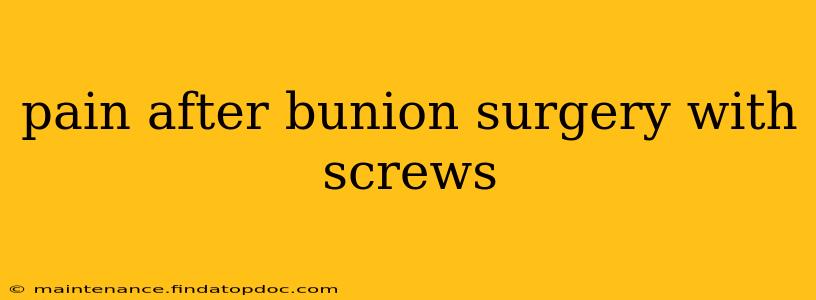Bunion surgery, often involving the insertion of screws for stabilization, can lead to significant post-operative pain. Understanding the causes, management, and expected recovery timeline is crucial for patients. This guide provides comprehensive information to address common concerns and help you navigate your recovery journey.
What Causes Pain After Bunion Surgery with Screws?
Post-operative pain after bunion surgery with screws is multifaceted. Several factors contribute to the discomfort experienced:
-
Surgical Trauma: The surgical procedure itself causes tissue damage and inflammation, leading to pain. The incision site, bone manipulation, and soft tissue dissection all contribute to this initial discomfort.
-
Screw Placement: While screws provide stability, their presence can irritate surrounding tissues, causing persistent pain in some individuals. The body's reaction to the foreign material can also lead to inflammation.
-
Swelling and Inflammation: Significant swelling is common after bunion surgery. This swelling puts pressure on nerves and tissues, exacerbating pain.
-
Nerve Damage: Although rare, nerve damage during surgery can occur, resulting in persistent or unusual pain patterns.
-
Infection: Infection at the surgical site can cause intense pain, swelling, redness, and other symptoms. This requires immediate medical attention.
-
Bone Healing: As the bones heal and remodel, there can be some associated pain. This is usually a dull ache rather than sharp pain.
How Long Does Pain Last After Bunion Surgery with Screws?
The duration of pain varies greatly among patients. While some experience significant pain for several weeks, others may have milder discomfort for a longer period. Several factors influence the recovery timeline:
-
Type of surgery: The extent of the surgical procedure affects the healing process. More complex procedures generally lead to longer recovery times.
-
Individual healing capacity: Each person heals at a different pace. Genetic factors, overall health, and lifestyle choices influence recovery.
-
Adherence to post-operative instructions: Following the surgeon's instructions meticulously is crucial for proper healing and pain management. This includes proper wound care, medication use, and physical therapy.
What Can I Do to Manage Pain After Bunion Surgery with Screws?
Pain management is a critical aspect of recovery. Your surgeon will likely prescribe medication, but other strategies can also help:
-
Pain Medication: Your surgeon will prescribe pain relievers, often a combination of over-the-counter medications and stronger prescription drugs. Follow the instructions carefully.
-
Elevation: Keeping your foot elevated above your heart reduces swelling and pain.
-
Ice Packs: Applying ice packs to the surgical site helps reduce inflammation and pain.
-
Rest: Adequate rest is essential for healing. Avoid activities that put stress on your foot.
-
Physical Therapy: Physical therapy plays a crucial role in restoring range of motion and strengthening muscles.
-
Proper Footwear: Wear comfortable, supportive shoes that accommodate the surgical site.
Is Pain After Bunion Surgery with Screws Normal?
Some level of pain is expected after bunion surgery, but severe or persistent pain warrants attention. Contact your surgeon if you experience:
- Increased pain despite medication
- Signs of infection (redness, swelling, pus)
- Numbness or tingling
- Excessive swelling
- Fever
How Can I Prevent Pain After Bunion Surgery with Screws?
While you cannot entirely prevent pain, you can take steps to minimize discomfort and promote healing:
-
Choose a qualified surgeon: Selecting an experienced surgeon is crucial for successful surgery and faster recovery.
-
Follow post-operative instructions precisely: This is vital for reducing complications and promoting healing.
-
Maintain a healthy lifestyle: A balanced diet and regular exercise (as recommended by your surgeon) contribute to faster healing and pain reduction.
When Should I Call My Doctor After Bunion Surgery?
Contact your surgeon immediately if you experience:
- Intense pain that doesn't respond to medication
- Signs of infection
- Increased swelling
- Changes in sensation (numbness or tingling)
- Fever or chills
Remember, recovery from bunion surgery is a process. By understanding the causes and management of post-operative pain, you can work with your healthcare team to ensure a smoother and faster recovery. Always consult your surgeon if you have any concerns or questions.
